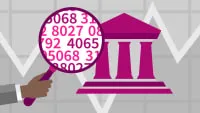
The Data Science of Economics Banking and Finance with Barton Poulson Online Class 
This online class, led by Barton Poulson, explores the data science behind economics, banking, and finance, and how it is revolutionizing the industry through algorithms, automation, big data applications, and machine learning. ▼
ADVERTISEMENT
Course Feature
![]() Cost:
Cost:
Paid
![]() Provider:
Provider:
LinkedIn Learning
![]() Certificate:
Certificate:
No Information
![]() Language:
Language:
English
Course Overview
❗The content presented here is sourced directly from LinkedIn Learning platform. For comprehensive course details, including enrollment information, simply click on the 'Go to class' link on our website.
Updated in [March 06th, 2023]
Barton Poulson's online class, The Data Science of Economics Banking and Finance, provides an in-depth look at how data science is transforming the world of economics, banking, and finance. Students will learn how algorithms, automation, big data applications, and machine learning are changing the way stocks are bought and sold, loan applications are processed, and fraud detection is conducted. Additionally, the course will explore how social media affects economic trends and why data scientists must be especially cautious when dealing with financial data to avoid making false assumptions. By the end of the course, students will have a better understanding of the data science behind economics, banking, and finance.
[Applications]
The application of this course can be seen in the way data science is used to inform decisions in economics, banking, and finance. Students can use the knowledge gained from this course to understand how algorithms, automation, big data applications, and machine learning are used to make decisions in the financial sector. They can also use the course to gain an understanding of how data science affects the way stocks are bought and sold, loan applications are processed, and even fraud detection. Additionally, students can use the course to gain an understanding of how social media affects economic trends and why data scientists must be especially cautious when dealing with financial data to avoid making false assumptions.
[Career Paths]
1. Data Scientist: Data Scientists are responsible for analyzing large datasets to uncover trends and insights that can be used to inform decisions. They use a variety of tools and techniques to extract, clean, and analyze data, and then present their findings in a meaningful way. Data Scientists are in high demand in the banking and finance industry, as they are able to provide valuable insights into customer behavior, market trends, and risk management.
2. Financial Analyst: Financial Analysts are responsible for researching and analyzing financial data to make informed decisions about investments. They use a variety of tools and techniques to evaluate financial data, such as financial statements, economic indicators, and market trends. Financial Analysts are in high demand in the banking and finance industry, as they are able to provide valuable insights into the performance of investments and the overall health of the economy.
3. Risk Manager: Risk Managers are responsible for identifying, assessing, and managing risks associated with investments and other financial activities. They use a variety of tools and techniques to identify potential risks, such as financial statements, economic indicators, and market trends. Risk Managers are in high demand in the banking and finance industry, as they are able to provide valuable insights into the potential risks associated with investments and other financial activities.
4. Financial Technology Developer: Financial Technology Developers are responsible for developing and maintaining software applications that are used in the banking and finance industry. They use a variety of tools and techniques to develop software applications that are used to automate processes, such as loan applications, stock trading, and fraud detection. Financial Technology Developers are in high demand in the banking and finance industry, as they are able to provide valuable insights into how technology can be used to improve the efficiency and accuracy of financial processes.
[Education Paths]
1. Bachelor of Science in Economics: This degree provides a comprehensive understanding of economic principles and theories, as well as the ability to apply them to real-world situations. Students will learn how to analyze data, develop models, and interpret economic trends. This degree is becoming increasingly important as data science and automation become more prevalent in the financial sector.
2. Master of Science in Financial Engineering: This degree focuses on the application of mathematics, engineering, and computer science to the financial markets. Students will learn how to develop and implement quantitative models to analyze financial data and make decisions. This degree is becoming increasingly important as data science and automation become more prevalent in the financial sector.
3. Master of Science in Data Science: This degree focuses on the application of data science to the financial sector. Students will learn how to analyze large datasets, develop predictive models, and interpret financial trends. This degree is becoming increasingly important as data science and automation become more prevalent in the financial sector.
4. Master of Science in Business Analytics: This degree focuses on the application of data science to business decisions. Students will learn how to analyze data, develop models, and interpret business trends. This degree is becoming increasingly important as data science and automation become more prevalent in the financial sector.
Course Syllabus
Data science and money
Algorithmic and human-in-the-loop trading
Automated application reviews for loans and credit
Real-time fraud detection
Social media and economics
Data science and cryptocurrencies
New methods for analyzing trends
Correlation and causality in economic data
Ethical and technical challenges and possibilities
Careers
Course Provider

Provider LinkedIn Learning's Stats at AZClass
This online course, led by Barton Poulson, explores the data science behind economics, banking and finance and how it is revolutionizing industries through algorithms, automation, big data applications and machine learning. In this course, learn how algorithms, automation, big data applications, and machine learning are changing the nature of economics, banking, and finance. Learn how data science can impact how stocks are bought and sold, how loan applications are processed, and even fraud detection amid the massive online exchange of financial information.
Discussion and Reviews
0.0 (Based on 0 reviews)
Explore Similar Online Courses

30-day Yoga PLAY Challenge : Days 22-25

Java Programming Lambda and more (Java 13 12 11 10 98)

Python for Informatics: Exploring Information

Social Network Analysis

Introduction to Systematic Review and Meta-Analysis

The Analytics Edge

DCO042 - Python For Informatics

Causal Diagrams: Draw Your Assumptions Before Your Conclusions

Whole genome sequencing of bacterial genomes - tools and applications

Applied Data Science: An Introduction

Big Data Integration and Processing


Start your review of The Data Science of Economics Banking and Finance with Barton Poulson Online Class